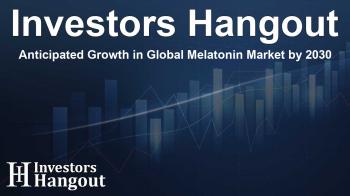Anticipated Growth in Global Melatonin Market by 2030

Anticipated Growth in Global Melatonin Market by 2030
The global Melatonin Market is currently witnessing a significant progression, due to growing consumer preference for sleep aids, dietary supplements, and various medical applications. Reports suggest that the market is projected to reach a staggering USD 3.0 billion by 2030, showcasing a robust compound annual growth rate (CAGR) of 9.67% during the period leading to 2030.
Understanding Melatonin and Its Role
Melatonin is a hormone naturally produced by the body that regulates the sleep-wake cycle. Over time, it has transitioned from a niche health supplement to a widely acknowledged product in the nutraceutical, pharmaceutical, and wellness industries. As more individuals become aware of the significance of sleep health and circadian rhythms, the demand for melatonin products continues to rise.
Meltatonin in the Medical Field
The adoption of melatonin transcends basic dietary supplementation; it's gaining traction within clinical practices as well. The expanding body of research validating melatonin's beneficial roles in neurology, oncology, and immune health significantly contributes to its increasing medical applications.
Market Segmentation and Key Players
The melatonin market can be divided into distinct segments based on type and application. Synthetic melatonin leads the market, accounting for over 70% of revenue due to its cost-effectiveness stemming from large-scale production. Meanwhile, natural melatonin, which generated USD 590 million recently, is preferred by consumers seeking organic alternatives.
Popular Applications
In terms of application, dietary supplements are the primary revenue driver, yielding around USD 1.1 billion recently. These supplements are widely used for managing insomnia, addressing jet lag, and promoting overall sleep quality, especially in regions like North America and Asia. Additionally, the medical sector is beginning to recognize melatonin for its applications in cancer care and treatment for neurodegenerative disorders.
Geographical Insights
The United States is at the forefront of the melatonin market, with a valuation of approximately USD 720 million. Several factors are fueling this growth, including:
- A significant portion of the adult population reporting difficulties with sleep.
- The convenience of over-the-counter availability and trusted brands such as Nature's Bounty and Natrol.
- Forward strides in clinical research exploring melatonin as a complementary therapy in various medical fields.
Similarly, Japan’s melatonin market is flourishing, primarily driven by the aging demographic's need for natural sleep aids. The shift towards functional foods and beverages further indicates a changing landscape for melatonin products in the region.
Current Trends Reshaping the Market
With increasing emphasis on preventive wellness, melatonin is becoming part of broader health conversations. Some current trends impacting the market include:
- A notable shift towards premium and natural variants of melatonin.
- Broadening therapeutic applications that extend beyond sleep into critical areas like cancer support.
- The rise of digital marketplaces, enhancing the accessibility of melatonin supplements.
Competitive Landscape and Industry Strategies
The melatonin market is witnessing intense competition among key players. Companies like Aspen Australia and Pfizer Inc. are making notable advances in pharmaceutical-grade melatonin formulations and clinical adoption, respectively. Additionally, BASF's commitment to expanding its synthetic melatonin capacity is significant for meeting the burgeoning demand globally.
Conclusion
As the world is collectively shifting towards healthier living and preventive wellness, opportunities within the melatonin market are growing. With established players and innovative new entrants in the nutraceutical sector, the market is well-positioned for sustained growth and diversification. The ongoing developments highlight not only a trend towards improved sleep management but also an expansion into broader health applications.
Frequently Asked Questions
What factors are driving the growth of the melatonin market?
The growth is driven by increasing awareness of sleep health, lifestyle-related stresses, and more clinical investigations into the benefits of melatonin.
How does synthetic melatonin compare to natural melatonin?
Synthetic melatonin is more cost-effective and widely available, making it a dominant player in the market, while natural melatonin is preferred by those seeking organic options.
What are the primary applications for melatonin supplements?
Melatonin supplements are mainly used to alleviate insomnia, manage jet lag, and promote overall sleep improvement.
Which region holds the largest market share for melatonin?
The United States currently holds the largest market share, significantly due to high consumer demand for sleep aids and supplements.
What emerging trends are influencing the melatonin market?
Recent trends include a shift towards natural products, growth in therapeutic applications, and increased online sales through e-commerce platforms.
About The Author
Contact Lucas Young privately here. Or send an email with ATTN: Lucas Young as the subject to contact@investorshangout.com.
About Investors Hangout
Investors Hangout is a leading online stock forum for financial discussion and learning, offering a wide range of free tools and resources. It draws in traders of all levels, who exchange market knowledge, investigate trading tactics, and keep an eye on industry developments in real time. Featuring financial articles, stock message boards, quotes, charts, company profiles, and live news updates. Through cooperative learning and a wealth of informational resources, it helps users from novices creating their first portfolios to experts honing their techniques. Join Investors Hangout today: https://investorshangout.com/
The content of this article is based on factual, publicly available information and does not represent legal, financial, or investment advice. Investors Hangout does not offer financial advice, and the author is not a licensed financial advisor. Consult a qualified advisor before making any financial or investment decisions based on this article. This article should not be considered advice to purchase, sell, or hold any securities or other investments. If any of the material provided here is inaccurate, please contact us for corrections.

